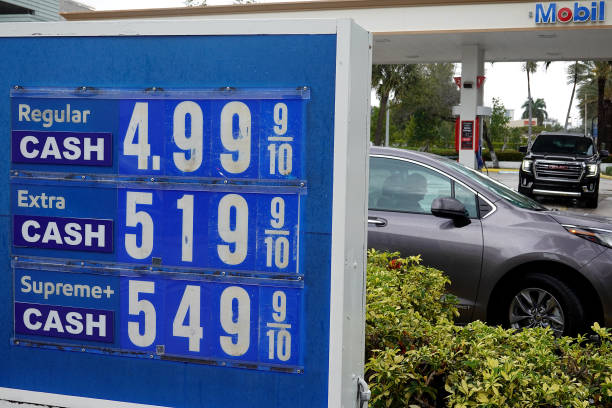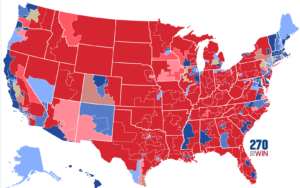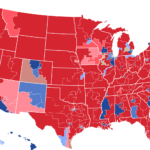During the last fifty years, gas prices have always been used as a barometer in American politics. When they are low, people consider the economy healthy and are more likely to approve of the sitting President’s policies. Conversely, when they are high, Americans perceive the economy as weak and are more likely to disapprove of the President.
The latter is where the United States finds itself today. In the last week, the national average of gas rose to an all-time high of $4.17 a gallon. That surpasses even the 2008 Economic Recession. Overseeing the country during this situation is President Joe Biden.
Many supporters of #46 argue external factors (most especially Russia’s recent invasion of Ukraine) are causing prices to rise dramatically. Opponents say Biden’s push toward’s renewable energy and the closing of the Keystone XL Pipeline among other policies have driven the U.S. away from energy independence and thus caused gas prices to increase.
Whatever the case, no one can deny Americans are really feeling the price hike at the pump. And with the 2022 Midterm Elections just 8 months away, Biden and the Democratic Party as a whole are very likely facing serious headwinds if gas prices continue to climb.
Gas Prices: How We Got Here
There are many factors contributing to rising gas prices in the United States. However, two really stand out as the main culprits. First is Russia’s invasion of Ukraine. Russia is a huge supplier of crude oil, and with American and European Union sanctions placed on the country, their ability to sell black gold is greatly reduced.
Countries are also beginning to boycott Russian energy, so demand for U.S. oil is increasing dramatically. According to the Associated Press, a barrel of U.S. oil settled at $119.40 a barrel, up 3.2% from last year. Furthermore, President Biden just announced a U.S. ban on Russian oil and gas imports. That will only cause gas prices to rise further.
The second culprit for rising gas prices is President Biden’s discontinuation of former President Donald Trump’s energy policies. America was less dependent on foreign energy, and specifically foreign oil when Biden’s predecessor was in office. Oil drilling and fracking on federally protected lands meant Trump could easily supply the U.S. with enough oil to avert the kind of energy crisis we now find ourselves in.
While many on the right claim these policies created total energy independence, the reality is they only prevented total reliance on other countries’ energy reserves. In fact, the U.S. was never completely energy independent during Trump’s time in office. The administration still imported about 7.86 million barrels of petroleum per day in 2020 alone. But because Trump had the ability to drill for massive quantities of oil in-house, any hiccups from the world would not have affected U.S. gas prices so dramatically.
More Than Just Gas
American news media always spotlights gas prices as the end all be all for the health of our economy. The truth is gas is far from the only quantity seeing its’ prices rise. Basically, anything Americans buy is subject to price hikes because companies utilize gasoline to transport said products to homes or stores selling the goods.
Go to the grocery store and you’ll likely see price hikes on many products such as fresh fruit and milk. Even highly processed foods distributed in high quantities like chips and condiments are noticeably rising in price. American consumers are feeling rising prices everywhere they look. And outside a quick resolution to the Ukraine crisis or a Biden policy reversal, it seems these prices will only continue to rise.
Another factor to consider in the gas calculus is Americans’ response to higher prices. Many lower-income individuals are already conserving energy and driving less. It may get to a point where people of all income brackets do this because spending $80 to fill up your gas tank is not a sustainable practice. The question for so many now is will gas rise so much that Americans are forced to adopt a 1970s style rationing of energy?
This idea is not totally out of the question with one of the world’s largest crude oil suppliers being hammered by sanctions. But even if the U.S. avoids this reality, there are still other things to consider. For one, could world-leading oil producers like Saudi Arabia leverage the U.S.’s energy crisis to extort this country for oil? At this point, anything is possible.
The Midterm Effect
As the article is titled, gas prices are inevitably intertwined in politics. Lower prices mean a better consensus on Biden while higher prices mean the opposite. With a Democratic President already struggling with approval numbers, rising gas prices are literally pouring fuel on the fire. In fact, Biden sits at just a 42.1% approval according to FiveThirtyEight. And that may even be generous with some polling showing the President in the high 30s.
Among independents, the numbers are even worse. Just 36% approve of Biden according to a recent CNN Poll. The President and his party face headwinds, and rising gas prices are only further cementing that reality. Historically, presidents always lose seats in the House of Representatives and Senate during their Midterm Elections.
To that end, Democrats have begun to sound the alarm on their electoral chances this fall. Democratic Senator Jon Tester of Montana recently said his party’s brand is becoming “toxic” in Middle America. Of course, Biden can’t be blamed for every mishap under his tenure, including Russia’s invasion of Ukraine.
But more often than not, the administration has failed to highlight its accomplishments. Moreover, they’ve failed to dispute many Republicans’ criticism that their energy policies are responsible for rising prices. Ultimately, Americans will decide how culpable Biden and Congressional Democrats are for what has transpired under their watch. The one question remaining is will that decision lead to 30 lost Democratic House seats, or 60?
Gas Price Roundup
Overall, rising prices in the United States will not only have a big impact on the Midterms this year, but it will continue to affect politics for decades to come. Gas is a quantity nearly everyone needs, so when a price hike comes, it affects everyone. Higher prices are not just a fad, they came upon us because of the Ukrainian crisis and Biden’s energy policies.
And it is clear rising gas prices mean higher prices for all with transportation being needed for everything. Because of this, the effect they will have on the Midterms is sizable. People tend to vote on policies affecting them most, and these issues obviously do just that.
Simply said, Americans have seen the struggles gas and other rising prices bring back home. People are cutting down on driving, choosing between food and much-needed vacations, and struggling to make ends meet. Obviously, no one wants higher gas prices, or for that matter, higher prices on anything. But that is the reality we find ourselves in.
And the role politics plays in this can not be understated. The 1970s proved people really do vote on gas prices, and in some cases, gas prices alone. So with the Midterms quickly approaching, let’s hope all prices come down, inflation is reduced, and people can begin to get back to normal. But as they say, only time will tell if that desire becomes reality.
Main Photo:













